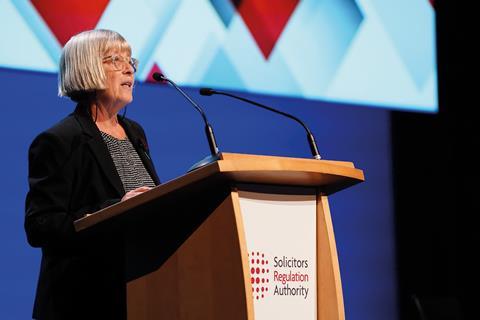Carson McDowell’s excoriating verdict on the SRA’s handling of the SSB Law crisis describes multiple missed opportunities to protect vulnerable clients. Yet no one has been held formally accountable

The Solicitors Regulation Authority has achieved a remarkable coup. Carson McDowell’s report into the circumstances of SSB Law’s demise can be read as even more damning than last year’s devastating investigation into Axiom Ince.
This time, the regulator has at least been self-aware enough not to attempt to brazen it out. But apologies (see below) are cheap. Even now, no one has resigned or otherwise been held formally accountable. Solicitors familiar with the uncompromising manner in which the SRA dispenses its own brand of justice can be forgiven their incredulity.
Carson McDowell’s report, commissioned by the Legal Services Board (LSB), painstakingly details how the regulator missed multiple opportunities over more than five years to protect vulnerable clients of the failed claimant business. More than 100 reports were made about the Sheffield firm’s handling of cavity wall claims, but the SRA did not act effectively or efficiently in response. Client complaints were routinely ignored and the SRA failed to heed its own warning notice about firms handling these claims.
The regulator thereby also failed in its obligation to protect consumers, leaving purportedly ‘no win, no fee’ clients facing bills of thousands of pounds for defence costs.
‘The SRA reached the view that the reports related to a complaint about the standard of service provided by SSB, rather than identifying that there was a pattern of behaviour by SSB which was sufficiently serious that it may result in regulatory action,’ the report states.
Even when SSB was on the verge of closure, the SRA allowed thousands of cavity wall claims to be transferred to JMR Solicitors, a firm of two partners that specialised in conveyancing. One SRA staff member suggested at the time that allowing JMR to take on SSB cases was ‘unpalatable’ and that clients had not consented, but no steps were taken by the regulator to prevent claims being ‘shunted around’. JMR chose to close last November.
SRA says sorry this time – but no one’s quitting
A contrite SRA has apologised to former clients of SSB Law for failing to spot warning signs that the cavity wall claims firm was in trouble.
However, chair Anna Bradley (pictured) rejected any suggestion that she or any of her fellow board members should resign in the wake of this week’s second damning report into the organisation from oversight regulator the Legal Services Board in the space of a year.
Bradley said: ‘We are sorry that we did not act more quickly in relation to SSB, and that issues in our handling contributed to the harm and distress suffered by the many vulnerable consumers affected. We fully accept the recommendations of this review and are committed to doing all we can to learn from this event and to implement its recommendations.
‘The case showed that we need to continue changing the way we spot and assess risk and use data, so that we can proactively identify new and emerging risks and threats and act on them before consumers suffer. We were keen to get on with addressing these issues ahead of the publication of this review, so we have already made significant changes to the way we work since 2024. We will now build on this, addressing any additional areas for improvement outlined.’

Bradley was questioned by journalists at a media briefing whose tone was very different from the press conference that followed Carson McDowell’s Axiom Ince report. A year ago, both Bradley and chief executive Paul Philip were unrepentant, declaring that ‘there is a lot in the report that we do not agree with, including the headline conclusions’.
By contrast, Bradley repeatedly stated this week that the SRA had accepted accountability for the SSB Law debacle, but added: ‘It is not our view that a resignation is going to help.’
Philip, who is shortly to retire, said no one involved in any of the investigations into SSB had been disciplined or sacked, but they have been placed on training programmes.
The Law Society, meanwhile, said that the affair demonstrates ‘wholesale change’ is needed at the SRA.
‘Once again [the Carson McDowell report] shows the SRA as lacking grip on managing key risks and responding adequately to protect consumers,’ Society president Mark Evans said. ‘The report lays bare a lack of leadership and oversight of regulatory procedures and processes at the SRA. This is despite knowing the risks posed by bulk cavity wall insulation cases, the previous failure of Pure Legal from which the SRA transferred clients to SSB, and multiple reports from MPs, other lawyers, industry and the victims themselves. A key concern must be the treatment of vulnerable victims by the SRA.
‘We know that the SRA will imminently have new leadership and that change comes at a crucial time for the organisation, which has been severely dented by the outcome of both the Axiom Ince and SSB reviews. In the space of 12 months, both independent reviews separately concluded that the SRA failed to act adequately, effectively and efficiently, and to take all the steps it should and could have taken.
‘This cannot just be about improving systems and processes but requires culture change and focused leadership.’
The LSB said it has decided to censure the SRA publicly and introduce performance targets to be met in the coming months and years. It opted not to fine the regulator, on the basis that to do so would harm firms and consumers.
Catherine Brown, interim chair of the LSB, said: ‘The former clients of SSB have suffered profound emotional and financial harm. There were several early warning signs about the firm, but this review reveals that the SRA failed to act on these. In the board’s view, these shortcomings allowed SSB to cause further harm to its clients and weakened trust and confidence in the regulation of legal services.
‘The action we are initiating reflects the scale of the human impact and the importance of holding regulators to account.’
SSB Law went into administration in January 2024 with debts of more than £200m. Creditors included a barrister who was owed £260,000 for work carried out in hundreds of cavity wall cases. As well as the clients affected, a number of cavity wall insulation contractors went out of business due to insurance premiums soaring because of the claims against them.
The LSB report states that SSB’s treatment of its clients could cause ‘irreparable damage’ to the reputation of the solicitors’ profession and civil justice system.
It reveals that, in 2019, the SRA established ‘Operation Grouse’, a working group to monitor cavity wall claims and the firms running them – including newly authorised alternative business structure SSB Law. Reports from 2020 raised concerns about the involvement of claims management companies, the lack of instructions from clients and the inadequacy of expert reports.
In November 2021, the same month that SSB took on 4,000 claims from the collapsed Pure Legal, the firm was put on an SRA watch list for closer attention.
A key missed opportunity to act came in April 2023, when a barrister made a report of non-payment of fees. This prompted a forensic investigation by the SRA, which was subsequently closed on the basis that no evidence was found that SSB was financially unstable. That was despite the fact that SSB owed £128m to litigation funders at high interest rates – one at 32% per annum over LIBOR – and had defaulted on previous funding loans. Moreover, much of SSB’s debt was secured against cavity wall cases, rather than the risk sitting with clients, and SSB had indicated to the SRA that these claims were unlikely to succeed.
A few months later, a whistleblower made a report about the firm’s financial position, which resulted in its closure.
The LSB makes recommendations in four areas: assessment of reports, the process for submitting a report, the investigations stage and the handling of firm closures. It says that the onus should be on the SRA to consider whether to investigate, not on the complainant to provide supporting evidence. Staff training and procedures should be reviewed, while the SRA should take a more proactive role in assessing the financial stability of firms.
And what of the LSB, which as recently as last year handed the SRA a glowing report card in its annual performance assessment? The oversight watchdog told journalists it is presently reviewing its processes for superintending frontline regulators.
A scandal in the making: SSB Law timeline

- October 2018: SSB incorporated and soon after authorised as an alternative business structure by the SRA with Jeremy Brooke (pictured), admitted in 1998, as chief executive
- Early 2019: SRA forms Operation Grouse to monitor cavity wall claims
- June 2020: First report to SRA from a client about SSB’s handling of claims
- July 2020: SRA issues warning notice to legal profession about cavity wall claims
- May 2021: First report to SRA about SSB from the Insurance Fraud Bureau
- November 2021: Thousands of claims transferred to SSB after the collapse of Pure Legal
- March 2023: Barrister complains to SRA about unpaid fees from SSB
- April 2023: SRA carries out a forensic investigation into SSB but takes no further action
- October 2023: SRA opens second forensic investigation into SSB
- January 2024: SSB enters administration
- May 2024: LSB engages Carson McDowell to review handling of SSB by the SRA
- October 2024: LSB publishes Carson McDowell report into the SRA’s actions in the runup to the 2023 collapse of Axiom Ince
- July 2025: SRA meets government ministers to discuss concerns about firms running bulk claims
- 15 October 2025: Carson McDowell reports on SSB
This article is now closed for comment.































11 Readers' comments